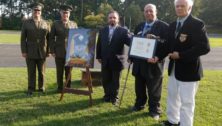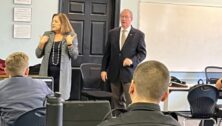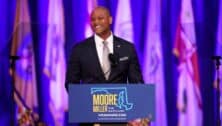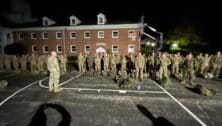Post-9/11 Veterans Topic of Nov. 10 Valley Forge Military Academy and College Town Hall
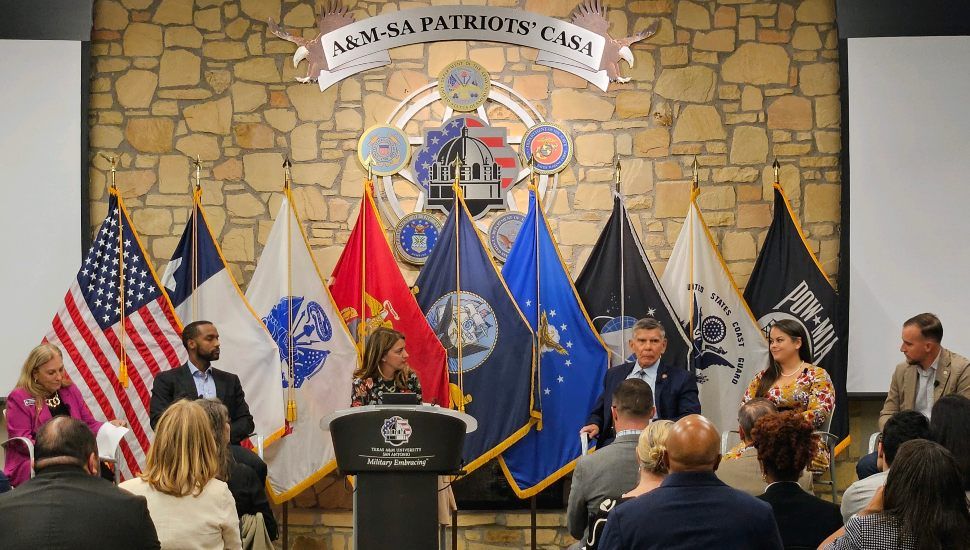
After the attacks of 9/11, the ranks of the all-volunteer military grew as dedicated men and women signed up to fight the enemies that had attacked the United States.
But what followed was not a single war, with a finite ending and a return home to cheering crowds.
Instead, multiple generations ended up in military service, largely ignored by the civilian population that covered more than two decades of deployments.
Now the post-9/11 veterans are here, ready to leave a legacy at home.
Valley Forge Military Academy and College in Wayne is co-hosting a Town Hall with Stanford University’s Hoover Institution on Nov. 10, 5 to 6:30 PM, to talk about those veterans.
“The 9/11 veterans that have come home can bring a lot to the community,” said VFMAC president Col. Stuart B. Helgeson, USMCR (R).
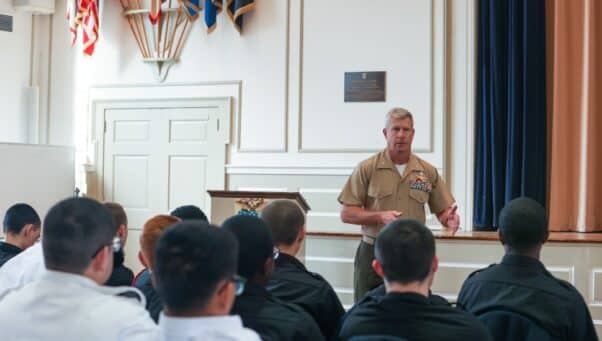
With that in mind, business and community leaders from Delaware and Chester Counties have been invited to the discussion, along with the general public.
Register in advance for the Town Hall here.
It is part of a series developed by the Hoover Institution taking place in eight cities over the next several months.
The goal of the series is to generate public discussion and bring together post-9/11 veterans and the civilian community.
“For a majority of Americans, they may not have had someone in the service during this time,” Col Helgeson said. “I think it’s a great series just to educate business leaders and officials and citizens at large of what these men and women can bring to the table.”
It’s a subject of particular interest at VFMAC, where many veterans work and where thousands of its graduates are vets.
Valley Forge Military Academy & College was recommended as a location for the Philadelphia area event by Hoover Senior Fellow Lt. General H.R. McMaster, USA (ret.).
Gen. McMaster is an alum of VFMAC and will be a panelist at the Town Hall meeting.
He served as a commissioned officer in the US Army for 34 years, retiring as a lieutenant general in 2018.
He was a national security advisor in 2017-18.
Col. Helgeson said VFMAC is looking forward to welcoming back Gen. McMaster and is honored to host the event.
“We were absolutely excited when contacted by the Hoover Institution asking us if we want to host, so we jumped at it,” Col. Helgesen said.
Gen. McMaster will also be a guest of honor for a cadet parade taking place before the Town Hall at 3:30 and is speaking to the Corps of Cadets at the Character Development program earlier in the day.
Other Town Hall panelists include U.S. Rep. Chrissy Houlahan (PA-6), a third-generation veteran who served in active duty and in the reserves as an Air Force engineer officer. She is a ranking member of the House Permanent Select Committee on Intelligence.
Her district is home to the Coatesville VA Medical Center.
A third panelist is Megan Andros, a Hoover Veteran Fellow in 2021-22. She is a senior program officer at The Heinz Endowments and is responsible for the foundation’s Veterans and Military Families Initiative.
Andros served five years as an ordnance officer in the U.S. Army’s First Cavalry Division. She is a veteran of Operation Iraqi Freedom.
A fourth panelist, Dave Foster, is a Hoover Veteran Fellow in 2022-23. He is founder and owner of BDP Impact Real Estate and was an infantry officer with the 101st Airborne Division. He did a tour in Afghanistan and had a posting at the Pentagon.
Program leader for the series is Dr. Jacquelyn Schneider, director of the Hoover Wargaming and Crisis Simulation Initiative.
She is a post-9/11 veteran who served six years of active duty in the Air Force and 12 years as an Air Force reservist.
Dr. Schneider remembers being in New York, signing up for the Air Force on Sept. 10, 2001.
At the time, the 18-year-old college freshman figured it was a good way to get a scholarship and maybe go to Europe.
The next day, the World Trade Center Towers were hit.
“The meaning of it changed instantly on that day,” she said.
Many of those who signed up for military service after the attack felt the patriotic pull, the desire to defend the homeland and to help each other through the horror.
For Dr. Schneider and most other post-9/11 veterans, that desire to serve, to do something meaningful, never left.
“There’s this really strong call for public service and a desire to contribute in a meaningful way to the communities they return to,” she said.
Dr. Schneider recently wrote a featured article in TIME Magazine, “The Legacy of the Post-9//11 Veterans,” arguing that the veterans, despite their differences, have a shared call to service that will shape their legacy as they return to civilian society.
“We are a generation bookended by the fall of the towers on one hand and a retreat from Afghanistan on the other—a generation whose chapter in history came to a close with no closure; no homecoming parades, no celebrations, no protests—no grand reconciliation between a returning military and its civilian society. It was just over,” she wrote.
She’s hoping the series will open a dialogue that will lead to national reconciliation and bring opportunities for these veterans to serve in ways that will solve many of the problems plaguing the nation and our communities.
“The theme of the talks is not how civilian society can support veterans. If anything, it’s the opposite; what responsibilities do veterans have to their communities? How can they build them up in the future?” Dr. Schneider asks.
Connect With Your Community
Subscribe to stay informed!
"*" indicates required fields















































![95000-1023_ACJ_BannerAd[1]](https://vista.today/wp-content/uploads/2023/03/95000-1023_ACJ_BannerAd1.jpg)


